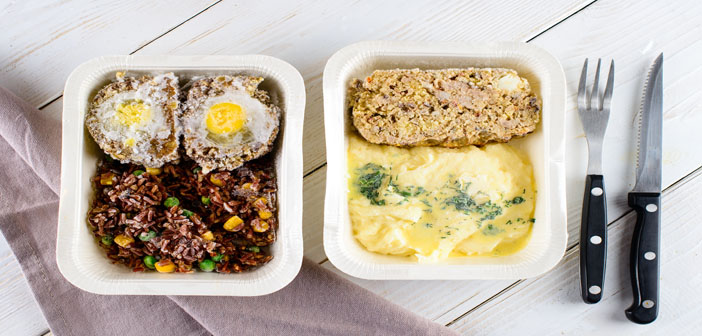The current health food mantra is that fresh is always best, but is it? Despite all the diet gurus telling you to shop only the periphery of the store, the freezer section has a lot to offer for health-conscious consumers and busy families alike. From more nutrients and fewer preservatives to less waste and lower grocery bills, read on to discover a few key benefits of frozen meals.
No Preservatives
Preservatives like sulfates, nitrites, trans fats and BHA have been linked to numerous health problems from asthma to cancer. Even table salt, which is often added in large amounts to preserve foods, can raise blood pressure. However, freezing is a natural method of preservation that adds no sodium, calories or chemicals to your food.
Unlike all those chemicals, freezing has been used to preserve food for thousands of years. Long before the conventional freezer was invented, people in cold climates kept meats and vegetables edible all winter. They did this by storing them outdoors or buried deep in a freezing cold cellar. Frozen foods are lower in preservatives than many fresh foods that must endure sitting on shelves for days or weeks.
Fresher Taste
Buying fresh food doesn’t mean you’re getting a fresher flavor. Most frozen foods are instantly frozen at very low temperatures when they’re at the peak of freshness. Fresh produce are usually picked just before they’re ripe and finish the process in a box or on a shelf. Some fruits, such as apples and pears, may have been sitting in storage for an entire year before you buy them.
If you think the seafood case offers the freshest fish and shrimp, think again. Most seafood is frozen on the boat, and grocery stores thaw it so they can market it as fresh. Go for the freezer case when you’re craving a taste of the sea to take advantage of better flavor and lower prices.
Packed With Nutrients
A common myth is that frozen foods are less nutritious than fresh. Freezing actually preserves and seals in the vitamins and minerals in food. Frozen foods often contain more nutrients than fresh foods because they are harvested closer to peak ripeness and quick freezing prevents nutrient loss. Are you choosing between canned and frozen vegetables? Frozen wins the nutrition race by a mile and costs about the same.
Lower Your Grocery Bill
Many families are tightening their budgets these days, and the grocery bill is usually the first expense that gets cut. While many people believe that eating healthy is too expensive, frozen vegetables are some of the most affordable options in the supermarket. Choosing frozen foods allows you to take a bite out of your budget without sacrificing taste or nutrition.
Make Meals Flexible and Convenient
Many families deal with busy weeknights where sports, after-school activities and mountains of homework make it difficult to put a healthy meal on the table. Frozen meals are convenient to make for a healthy, delicious dinner in a jiffy without resorting to delivery or a drive-thru window.
Frozen foods also make it easy to be flexible with what you’re serving. While fresh foods require careful planning to use them before they spoil, frozen foods let you change the menu on a whim knowing unused ingredients will stay perfectly fresh for another time. Plus, keeping a few frozen meals on hand is an effective solution for picky eaters that can keep you from cooking two or three separate meals every night.
Do you prefer to make your meals ahead of time? Frozen foods are great for meal prep because they’re already frozen and ready to go into your containers. Meal prepping with fresh foods can result in sub-par taste and texture because your home freezer doesn’t lower the temperature nearly as quickly as commercial flash freezing.
Improve Your Family’s Diet
The freezer section offers a variety of healthy foods from every food group, including fruits and vegetables. Lean meats, whole grains and low-fat dairy are some healthy freezer options, as well. Keeping these items on hand is a great way to increase the quality of your family’s diet and fill in nutrition gaps when you’re out of fresh foods.
Frozen foods are an especially valuable resource for families who live in food deserts where fresh foods are difficult to obtain. Stores in these low-income, often remote locations, can’t afford to offer quick-to-spoil meats and produce. They can actually afford to stock frozen foods that keep for months.
Reduce Food Waste
About one-third of the world’s food production is wasted every year. Freezing food is a great way to combat waste by keeping foods fresher longer. All those fresh meats, produce and bakery goods on a supermarket shelf only last a few days before they have to be discarded. Frozen foods are just as fresh on their expiration date as they were when they arrived at the store.
Thousands of pounds of produce are thrown out every year just because they aren’t pretty enough to display. Pre-cooked frozen meals can reduce food waste by making use of all the ugly, misshapen fruits and vegetables that get discarded before they ever reach store shelves. Customers will never notice that their frozen mashed potatoes or zucchini noodles were made from an ugly vegetable.
Choose Wisely
When choosing frozen foods, remember that not all are created equal. Skip over deep-fried and sodium-packed options like stuffed sandwiches, nuggets, fish sticks and pizza. Go for healthy frozen meals that contain vegetables, whole grains, beans and legumes. You can also assemble your own meals from frozen whole foods like meats and produce.









